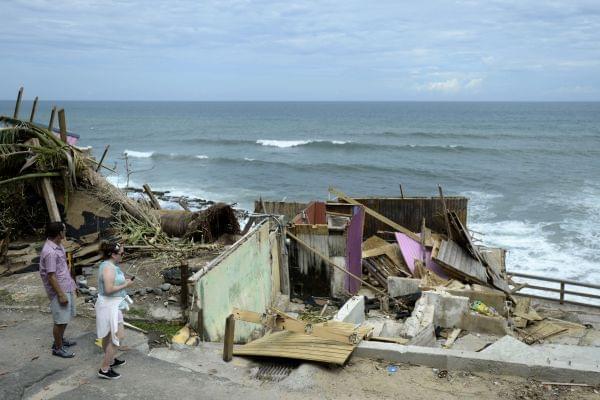One Year Since Hurricane Maria; Reconciling with Racism on Yom Kippur

Carlos Giusti/AP
On The 21st: As Jewish communities get ready for the holy day of Yom Kippur, we talk about forgiveness, atonement and how to reconcile with America’s racist past and present. But first, a year ago this week, Hurricane Maria made landfall in Puerto Rico. We hear from Puerto Ricans about what the past year has been like.
As the southern US continues to deal with Hurricane Florence, we wanted to take a look back on the past year since Hurricane Maria made landfall in Puerto Rico.
Large parts of the island were without power for months. In fact, it wasn’t until last month that power was restored to nearly the entire island. Many fled for the US mainland, and unfortunately thousands lost their lives. That official number is now just under 3,000.
Many of those Puerto Rican residents came to Illinois, specifically, to Chicago.
Luis Clemens joined us from Washington. He’s supervising editor of NPR’s National Desk.
We also spoke with Richard Santiago. He was a resident of Puerto Rico until he had to leave for Chicago because of the storm. He actually recently moved again, this time to West Palm Beach, Florida.
Lastly, we spoke with Cristina Pacione-Zayas, she’s co-chair of the Puerto Rican Agenda in Chicago which is a group of Puerto Rican organizations.
"My art has forever changed...when I left P.R, the last thing I was thinking about was painting...it was all about relief."
— The 21st (@21stShow) September 18, 2018
- Artist Richard Santiago
"You can take the path of leaving & not looking back, or leaving & always being linked to the people on the island struggling." pic.twitter.com/dsGb3RcWkO
Plus-
Jewish people around the world are gathering tonight and tomorrow for their holiest day of the year Yom Kippur. It is known as the day of atonement, and today we wanted to think about atonement not just for the Jewish people, but for America as a country, when it comes to race. And not just today in 2018, but what people may have been thinking about during Yom Kippur fifty five years ago in 1963 during the height of the Civil Rights movement.
A clue to this comes from Abraham Joshua Heschel, a Jewish American rabbi, scholar and philosopher who was very active in the U.S. Civil Rights Movement. And in 1963 he gave a speech called “Religion and Race,” where he met Martin Luther King, Jr. He ended up marching from Selma to Montgomery with him, and in that speech you can tell that he deeply connected the plight of the Jewish people with that of African Americans in this country. And a need for all Americans to repent.
Joining us to talk more about this was Brett Ashley Kaplan. She’s the Director of the Initiative in Holocaust, Genocide and Memory Studies at the University of Illinois. Rabbi Ariel Naveh is a Senior Jewish Educator at the University of Illinois’s Hillel. He also joined us.
In 1963 Abraham Joshua Heschel said "it was easier for the children of Israel to cross the Red Sea than for a Negro to cross certain university campuses."
— The 21st (@21stShow) September 18, 2018
Rabbi Ari of @IlliniHillel
wants to be Heschel when he grows up!
Full speech: https://t.co/NvnsgepwNO

